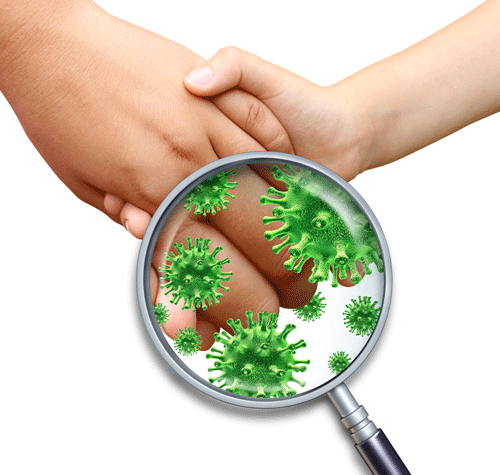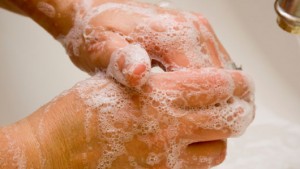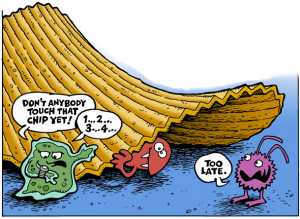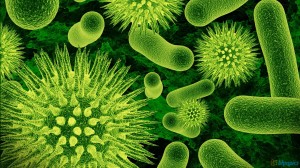Top 15 Ways To Avoid Getting Sick From Germs

 Germs are everywhere, and when I say everywhere I mean everywhere. This is why it’s so easy for one to get sick or infected by just simply shacking someone’s hands or receiving money from them. There are simple steps to avoid getting sick from germs and they don’t even take a lot of time to see through.
Germs are everywhere, and when I say everywhere I mean everywhere. This is why it’s so easy for one to get sick or infected by just simply shacking someone’s hands or receiving money from them. There are simple steps to avoid getting sick from germs and they don’t even take a lot of time to see through.
- Hand Washing – Wash your hands frequently and regularly, especially after going to the bathroom, before and after preparing food, after touching animals and pets and if someone in your household is ill. It is important to use soap and water, scrub underneath your nails and the back of your hands, between your fingers and dry thoroughly with a paper towel or clean dry towel.
- Surface Disinfection – Commonly touched surfaces should be regularly disinfected and not just wiped down with a wet cloth. Kitchen surfaces should also be cleaned and disinfected before preparing food and immediately after they have been in contact with raw foods such as meat and poultry, to reduce the chances of cross contamination and getting infected.
- Proper Food Handling – To avoid food-borne illnesses and getting sick from them cook and store food at the proper temperature; separate raw meats from fresh produce and packaged goods in your grocery bag and refrigerator; and again regularly disinfect surfaces to prevent cross contamination.
- Soap and water don’t actually kill bacteria, but they create a slippery environment so that they slide off. That’s why it’s so important that you rub your hands together with soap for at least 20 seconds (about as long as it takes to sing the Happy Birthday song twice), making sure to clean well between fingers and under the nails. Use warm water and work up a good lather all the way up to your wrists making sure all skin surfaces i.e. backs of hands, wrists, between your fingers and fingernails are given a good scrub.
- Anti-bacterial liquids and abrasive soaps are not recommended as they upset the skin’s normal flora, which is needed to keep more undesirable bacteria from taking over. It was also reported that anti-bacterial liquids and soaps is instrumental in the contribution to the development of antibiotic resistant bacteria. Furthermore, the chemical, triclosan, in antibiotic soaps and liquids is said to kill human cells.
- Alcohol-based instant hand sanitizers which comprise mainly of alcohol are safe to use they should contain at least 60% alcohol to be effective. Hand sanitizers may kill germs but they do not remove dirt. So you still need to wash your hands with soap.
- Do not wash your hands and even other parts of your body e.g. face vigorously so as to thin or damage the skin e.g. abrasive liquids or soaps or cause the removal of protective oils produced by your skin. Your skin is your first line of defense against bacteria and toxins. Protect broken or cracked skin from exposure to bacteria with necessary wound dressings. The presence of bacteria in your wound can prolong the healing process. The skin of the human body is alive with life – microscopic life of all kinds.
- A straight 5 percent solution of vinegar—such as you can buy in the supermarket—kills 99 percent of bacteria, 82 percent of mold, and 80 percent of germs/viruses.
- Avoid brushing your hands against your eyes, nose and mouth if your hands have come into contact with such high risk germ infested places. You should be extra vigilant when there is an epidemic or someone in your house has a contagious illness even coughs and colds.
- Be sure to close the toilet lid before you flush the toilet to keep microbes inside the bowl from splashing as far as 20 feet onto you, counters and anything on them. These floating bacteria can stay in the air for at least 2 hours before settling on everything in the toilet / bathroom.
- Use tissue paper, if possible, when making physical contact with high risk contaminated objects and discard the tissue paper immediately after.
- Disinfect highly suspect germ infested areas in your home regularly with non-antibiotic soaps.
- Teach everyone around you, friends and family about germs and hygiene. We all know that they’re there but don’t take them seriously.
- Immune health depends on eating right, getting enough sleep and exercise, and avoiding environmental toxins and stress.
- Take high quality health supplements that build up your immune system, vitamins etc.

The 5-Second Rule
The new rule amongst all of us lately is the “5 seconds rule” that says if the food drops onto the floor, it is safe to eat it if you pick the food up within 5 seconds. There is no scientific evidence to this 5 second rule. Germs can jump onto the food as soon as it lands on the floor etc. So don’t practice this disgusting habit. Even if you are so poor, you can’t afford to throw away your food; this practice is not recommended as your medical bills will be more than the cost of the food that fell onto the floor.
Remember, germs never sleep. They show no mercy. They are getting stronger, spreading faster. Germ Warfare is not a myth even during “disease free” times. Germs are with us; All. The. Time. If you take the necessary precautions outlined above, you will be able to stay healthy and keep the germs from taking over your body.





